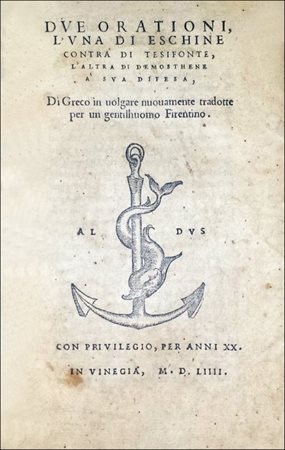 Bibliopathos - Via Enrico Toti 1, 37129 Verona
Bibliopathos - Via Enrico Toti 1, 37129 Verona
Medieval Notary Manuscripts & Law Books Sessione Unica - dal lotto 1 al lotto 280
Monday 28 December 2015 hours 17:00 (UTC +01:00)
AESCHINES' AND DEMOSTHENES' HARANGUES: PROSECUTION AND DEFENSE IN A FAMOUS...
AESCHINES' AND DEMOSTHENES' HARANGUES: PROSECUTION AND DEFENSE IN A FAMOUS TRIAL OF ANCIENT GREECE
DEMOSTHENES-AESCHINES. Due orationi, l'vna di Eschine contra di Tesifonte, l'altra di Demosthene à sua difesa. Di greco in volgare nuouamente tradotte per un gentilhuomo firentino [sic]. In Vinegia: [Venice: heirs of Aldo Manuzio], 1554.
8vo, attractive binding in 18th century water-colored wrappers, ff. 106, [2]. Text in Italian, translated from Greek language by the Florentine humanist Girolamo Ferro.
Aldine dolphin and anchor device on title-page and final leaf (woodcuts).
Capital spaces with guide letters.
First and only Aldine edition of the two harangues by Aeschines and Demosthes, the first one as Ctesiphon's prosecutor and the second as his defense attorney.
Demosthenes won the legal battle with Aeschines, although Aeschines' legal objections to the crowning were probably valid.
THE TRIAL:
Ctesiphon was an orator in Athens during the reign of Alexander the Great. He is best known for sparking this controversy that led to Demosthenes' speech «On the Crown» and Aeschines' speech «Against Ctesiphon».
In 336 BC, Alexander the Great's empire was spreading, and many in Athens were opposed to the ongoing wars. Among the most outspoken was the orator Demosthenes. In 336 BC, Ctesiphon proposed that Athens honor Demosthenes for services to the city by presenting him with a golden crown. This proposal became a political issue, and in 330 BC, Aeschines prosecuted Ctesiphon on charges of legal irregularities. In his most brilliant speech, On the Crown, Demosthenes effectively defended Ctesiphon and attacked vehemently those who backed Alexander the Great's empire. On legal irregularities Aeschines prosecuted Ctesiphon for having violated the law in three points:
1. For making false allegations in a state document.
2. For unlawfully conferring a crown to a state official (Demosthenes) who had not yet rendered a report of his term of office.
3. For unlawfully offering the crown at the Dionysia.
Demosthenes (384–322 BC), was a prominent Greek statesman and orator of ancient Athens. His orations constitute a significant expression of contemporary Athenian intellectual prowess and provide an insight into the politics and culture of ancient Greece during the 4th century BC. For a time, Demosthenes made his living as a professional speech-writer (logographer) and a lawyer, writing speeches for use in private legal suits.
He went on to devote his most productive years to opposing Macedon’s expansion. He idealized his city and strove throughout his life to restore Athens’ supremacy and motivate his compatriots against Philip II of Macedon. He sought to preserve his city’s freedom and to establish an alliance against Macedon, in an unsuccessful attempt to impede Philip’s plans to expand his influence southwards by conquering all the Greek states.







